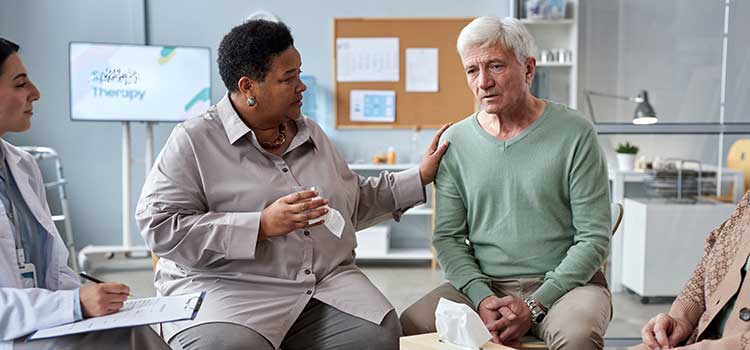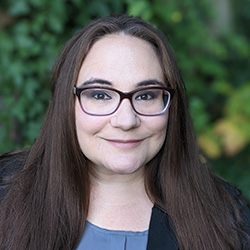Related Career Guides
- Guide to Developmental Psychology
- Become an Existential Therapist
- Becoming a Pastoral Counselor
- Becoming a Neuropsychologist
- Becoming a Social Psychologist
- Guide to Transpersonal Psychology
Advancing Your Career
Education to become a Geropsychologist

For adults aged 65 and older, confronting the emotional and physiological problems that come with age doesn’t always come easy. The oldest 10% of the population may be able to recall a time when disorders of the mind and memory issues were deeply misunderstood. Treatments could be severe and life-derailing, and the thought of seeking help was difficult.
Elderly adults face more and more challenges with each passing year. Many of these changes and challenges take a toll on their emotional health. Whether it’s the loss of lifelong relationships, autonomy or control of their body, there is no shortage of reasons for aging adults to seek therapy.
Yet there is only a thin margin of psychologists who specialize in geropsychology—the psychology of understanding and helping older populations and their families deal with emotional problems, maintain their health and live life to the fullest. The American Psychological Association reports that just 1.2% of psychologists describe elder populations as their specialty.
What is geropsychology?
Geropsychology is defined as a psychology niche that specializes in the understanding and treatment of older adults. This branch of psychology focuses on helping not just seniors but also their families maintain a high quality of life, overcome obstacles and deal with the complex physical, mental and emotional effects of aging.
Their mental health needs can be complex and targeted, and age-specific treatment can lead to better outcomes that dramatically increase their quality of life. For instance, it is the elderly population that is at the greatest risk of suicide. Senior citizens make up 16% of the U.S. population but account for 18% of all suicide deaths.
There are several reasons that contribute to this statistic. For example, lower levels of digital literacy combined with a lack of independence and representation can make the elderly population vulnerable to being preyed upon financially and psychologically. Living on a fixed income, as many seniors do, creates stressful budgeting concerns that can become overwhelming quickly.

Elderly adults face issues that require empathy, care and appreciation for this later stage of life.
Issues that older adults can struggle with include:
- The transition from working to retirement; feelings of self-worth.
- Coping with the death of a spouse or friend.
- Shifting roles in their personal family dynamic (caring for vs. being cared for).
- Mourning the loss of independence (inability to drive, need for an in-home nurse or having to relocate to assisted living)
- Memory and increasing mobility issues.
This branch of psychology is growing, but currently still represents a very small percentage of psychologists, with just 4% of psychologists claiming to have some training in the field of geriatric psychology. This makes it a viable specialized field to pursue in the long term.
Should I become a geropsychologist?
Job satisfaction among geropsychologists can be hard to measure. This is mainly due to the fact that only a small population of geropsychologists exists. However, for those studies that do exist, the overwhelming majority of those who work in gerontology report extremely high job satisfaction.
Where job outlook is concerned, there will be a growing need for professionals who can help elderly populations transition into retirement and everything that comes after. By 2030, all Baby Boomers will be older than age 65. They’re anticipated to make up 20% of the U.S. population, outnumbering children ages 18 and younger for the first time in U.S. history.
As negative stereotypes about the elderly shift, more older adults are expected to seek an improvement in their quality of life through services such as geropsychotherapy. Therefore, this is a career field with growth potential equal to or surpassing the average growth outlook of 5% for most careers nationwide.
The Geropsychology Knowledge and Skill Assessment Tool from the Council of Professional Geropsychology Training Programs is a great place to start. It can provide a glimpse into what geropsychologists do and help you assess your interest.
6 Steps to become a geropsychologist?
From starting school to finishing your education, field work and licensing exam steps, becoming a practicing geropsychologist can take anywhere from 10 to 12 years.
Like all psychologists, you’ll begin your journey with a standard bachelor’s degree that covers the foundations of mental health and move on to more specialized studies. Your geropsychologist education will include hands-on, pre-professional training that will eventually lead to licensure and a rewarding career in the field.
It’s also worth noting that, while geropsychology focuses on elder care, it is a relatively new specialty. That means that there is a need for research psychologists and educators in this complex field. It also means there are a few directions you can take your career.
Complete the geropsychology education requirements

A bachelor’s degree takes three to four years to complete. During these formative years, students will learn the fundamentals of psychology and psychotherapy. Some of the common classes students will encounter may include:
● Marriage & family counseling
● Substance abuse & addiction
● Behavioral therapy
● Abnormal psychology
Geropsychologist Education Requirements
A master’s degree is the minimum educational requirement in order to work with patients in the field of psychology. In your fifth and sixth years of study, you’ll have the opportunity to specialize and focus on geropsychology, specifically. During your studies, you’ll complete supervised training (called an internship or practicum) as part of your degree. This supervised training will provide you with the experience you need to be confident enough to provide care once you graduate.
The great majority of psychology programs require a PsyD degree in order to practice and a PhD in order to teach psychology; geropsychology is no exception. This involves two years of study and research combined with two years of supervised clinical training.
Specialized doctoral programs are in short supply for geropsychologists. That’s why the Council of Professional Geropsychology Training Programs (CoPGTP) recommends several resources for students looking to gain specific knowledge and experience in the psychology of aging.
Complete a post-grad clinical internship or supervised fieldwork.

The requirements to qualify for licensure and jurisprudence exams vary by state. Your state’s Department of Health will likely be the best resource for up-to-date licensing requirements specific to your degree and career path.
As a general rule, applicants are expected to complete 3000 hours or more of clinical training in order to apply for licensure and complete all necessary exams.
In addition to the CoPGTP, The Society of Clinical Psychology lists internship and fellowship opportunities on their site. The American Psychological Association suggests the Veterans Administration as an additional resource.
Complete your EPPP and jurisprudence exams and apply for licensure in your state.

The Examination for Professional Practice in Psychology (EPPP) and your state’s jurisprudence exam are the last steps between you and a license to practice as a geropsychologist.
The Association of State & Provincial Psychology Programs administers the EPPP through Pearson Vue. You must submit proof of education, research, internship and pre-professional hours before you can qualify to take this exam. Once you have passed this written exam, you’ll be eligible to take the jurisprudence exam in your state.
The jurisprudence exam is open-book and designed to familiarize psychologists with laws specific to healthcare delivery in their state. The purpose of this exam isn’t to assess your fitness as a psychologist. Rather, it’s to protect the public by measuring your mastery of knowledge and skills regulated by state law.
Once you’ve completed both exams, you’ll be eligible to submit your application for licensure. The entire process can take anywhere from one to three months.
Consider board certification.

While it isn’t a requirement for licensure, board certification indicates a level of expertise beyond the bare minimum. The American Board of Geropsychology (ABGERO) and the American Board of Professional Psychology (ABPP) offer national board certification.
In addition to meeting general requirements for ABPP diplomas, candidates need 2,000 hours of formal geropsychological training or 3,000 hours of informal training. They must have post-license experience with older adults, and must submit practice samples as well as attend an oral examination.
Start your career as a geropsychologist.

Geropsychologists are needed in long-term care and outpatient facilities for seniors. But they will also find their services may be in high demand at Veteran Affairs Hospitals. Private practices, academic institutions and even research centers also need the help of qualified psychologists who specialize in elder care.
Complete continuing education credits and renew your license every three years.

Every three years, psychologists will be required to renew their license. As a condition of renewal, you will be required to complete 60 hours of continuing education units. These must be courses approved by the American Psychological Association. Courses taken toward additional certification or continuing education can most often be applied toward this requirement as well.
Geropsychologist salary
Naturally, you’re probably asking yourself—how much does a geropsychologist make? Currently, geropsychologists make up a small niche of practicing psychologists. However, the U.S. Bureau of Labor Statistics puts the median annual salary of psychologists at $117,750 a year. Here are the latest median annual salaries state-by-state for psychologists.
Factors that can impact your salary
There are many factors that can impact your salary as a geropsychologist. Some of them are things that have nothing to do with your geropsychology education or experience. A few things that can have a big impact on your salary range include the specific employer or industry you’re most interested in working in, and also the location you’d like to practice.
Factors that lie entirely in your control include the degree you earn, the amount of experience you have when applying for work at an institution, the certifications you choose to pursue and the professional affiliations you attract, such as the American Psychological Association (APA) or American Counseling Association (ACA).
How does a geropsychology salary compare to similar occupations?
There are many factors that contribute to the median salary of a given career path. Since you’re ultimately the one who stands to benefit, empower yourself to research as many careers as possible before you decide which one is right for you.
Some geropsychology-adjacent careers that may also be of interest to you may include:
Highest-paying cities/metros for geropsychologists
Making an informed decision is important. If you’re wondering which metropolitan areas pay the best, take a look at the top 10 areas the BLS has identified as having particularly high-paying median annual salaries for psychologists:
Where are geropsychologists most in demand?
Veteran Affairs (VA) hospitals often employ geropsychologists. Aging veterans face a diverse and unique set of challenges. As veterans recover from surgery, deal with illness or seek treatment for mental illness, they benefit greatly from the help of experts who also understand the complex issues associated with aging.
Geropsychologists also find work in outpatient and long-term care facilities where seniors reside. These populations are in need of compassion and empathy as they navigate loss of independence and declining health. Some geropsychologists may find work full-time in their own private practices, while others may join existing practices to expand that office’s range of care.
What being a geropsychologist is all about
Negative stereotypes about aging—even among psychology undergrad and graduate students—are part of what keeps elderly populations isolated and underserved. That’s why a deep knowledge of existentialism encompassing the psychology of aging, death, spirituality and a basic understanding of the vulnerabilities that senior citizens face will be your ally in this career field.
What you’ll do as a geropsychologist
Each patient is completely unique, and so are the services they may need. As a geropsychologist, you may be called upon to do many things on a given day.
You may be conducting a comprehensive evaluation of older adults on Monday, assessing for the presence of psychological syndromes or neurocognitive disorders that impact their independence.
On Tuesday you could be holding family feedback conferences to share assessment results and recommendations with a patient and their family.
You may be asked to provide driving evaluations for adults with concerns about driving safety, aiming to determine if there’s any cognitive reason they can’t or shouldn’t drive.
It may fall to you to provide follow-up psychotherapy to patients after they complete an evaluation. You’ll have to determine the best course of therapy for a wide variety of problems that range from mood disorders and anxiety relating to aging and life transitions to caregiving stress or concerns about medical care.
Like most psychologists, you will rely on talk therapy and evidence-based practices to assess and treat your patients. You will use past interviews, case histories, observational techniques and direct responses to collect and interpret data that can be used to develop treatment plans. You’ll create realistic goals with clients and evaluate the effectiveness of treatment at each meeting.
Documenting interactions, taking notes and completing required paperwork is a big part of your day as well. You may need to transcribe notes to a patient’s chart, review past data or complete forms a patient needs.
No two days will likely be the same.
What are clients looking for?
There are a few things every geropsychology patient will have in common.
They are expecting compassion. Senior citizens are used to being overlooked and feeling invisible. It is not uncommon for them to experience physical pain or even disabilities that make getting to their appointments a challenge.
Patience is another quality that these patients need. They could have trouble speaking, may speak slowly, may have trouble writing or typing, and may not have a strong degree of digital literacy. Demonstrating patience, actively listening and asking insightful questions is a great way to build trust with clients.
Clients also need their therapists to understand that finding a geropsychologist may not have been their idea. This could be a course of action set in motion as part of a loss of independence. Their visit could be a requirement they need to fulfill in order to qualify for a service or be discharged from a hospital. Empathy and understanding will go far in reaching these patients.
The skills you’ll need
Most of the skills you’ll need to deliver quality care requires years of study, practice and experience. However, there are many transferable skills that make some psychologists more successful than others. Those can include:
- Active listening (paying close attention to what others say and asking thoughtful questions for clarification as needed)
- Time management
- Assessment (of yourself, other individuals, and organizations, always ready to take corrective action)
- Critical thinking
- Social perceptiveness
- Interpersonal communication skills (essential for connecting with clients)
- Writing
- Service orientation
- Negotiation
- Ethical judgment
- Integrity (necessary for working with vulnerable populations such as seniors)
The tools and technology you’ll likely use
Digital literacy is a common requirement of any administrative job, and psychology falls into this category due to the nature of patient care. In addition to word processing, spreadsheet and presentation software, there are some specialty programs that will be valuable to familiarize yourself with:
- Accounting / billing software
- Analytical or scientific software (Comprehensive Affect Testing System CATS; Noldus Information Technology; Statistical software)
- Calendar / scheduling software (SpectraSoft AppointmentsPRO; Thriveworks TherapyBuddy)
- Medical software (electronic health record software systems)
Where you’ll work
Common places of employment for geropsychologists include:
- Hospitals
- Long-term care facilities
- Outpatient facilities
- Private practices
- VA Hospitals
- Research centers
- Academic institutions
Professional organizations to join along the way
Networking and joining groups is a great way for professionals in the psychology arena to decompress and share resources. here are just a few groups to consider:
APA Office on Aging: The Aging office’s mission is to promote the application of psychological knowledge to issues affecting the health and well-being of older adults.
Psychologists in Long Term Care: PLTC is dedicated to the advancement of psychological practice in long-term and skilled nursing care.
Council of Professional Geropsychology Training Programs: The council is an international organization focused on programs that provide geropsychology training consistent with the Pikes Peak Model for Training in Professional Geropsychology.
Society of Clinical Geropsychology: The society’s goal is to advance the field of Clinical Geropsychology through the scientific study of mental health of older adults, delivery of culturally astute psychological services, advancement of training and continuing education and collaboration among geropsychologists.
Frequently asked questions
What is the difference between a geropsychologist and a traditional psychologist?
All psychologists receive training in therapies and assessment that qualifies them to serve a wide variety of patients. Geropsychologists possess the same core training and foundation knowledge of psychology as a therapist or school counselor.
The difference between a geropsychologist and any other type of psychologist is in the amount of specialized training they have in elder issues. Senior populations deal with physical, emotional and cognitive challenges that are unique to children or adults.
Geropsychologists are immersed in the challenges that face older adults. Their experience studying and serving seniors gives geropsychologists a definite advantage when it comes to reaching goals and improving a patient’s quality of life.
Why is geropsychology important?
Vulnerable populations need representation. Just as you wouldn’t counsel a toddler in the same manner as you would a teen, senior citizens deserve specialized care that caters to the stage of life they’re in.
Negative stereotypes about senior citizens have created barriers to care that compound the obstacles they face naturally (mobility, access to resources, mental fitness). Aging is an ongoing and lifelong process, and one that we will all face. Helping to set a precedent for quality care at every age improves the quality of life for everyone.
How can older adults and their families access the services of a geropsychologist?
Referrals are the most common way that older adults and their families find the services of a geropsychologist. Sometimes these referrals come from a large agency, such as a rehabilitation facility.
Families can seek out the services of a psychologist who specializes in aging when they’re struggling with a family member transitioning from independent to dependent living. Many geropsychologists find their patients within an organization they’re working, such as a hospital or long-term care facility.
Is geropsychology a good specialty?
As the global population ages, more and more psychologists will find themselves working with older adults. As the needs of older adults become more apparent in this growing field, those with specialized training will be uniquely positioned to earn more and do greater good than someone without it.
The Institute of Medicine published a report many decades ago that defined a good death. It is one that is “free from avoidable distress and suffering for patient, family and caregivers, in general accord with the patient’s and family’s wishes, and reasonably consistent with clinical, cultural and ethical standards.”
As a geropsychologist, you will directly impact a patient’s quality of life, thereby helping to provide them with the best tools and mindset to make the journey. It can be a challenging field, but also extremely fulfilling.
Published: April 5, 2023

